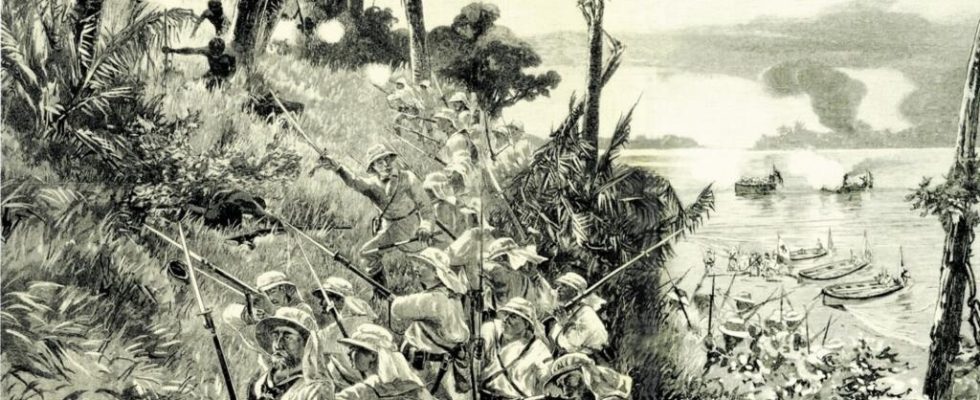In 1884, Lock Priso Bell, king of Hickory Town, the current Bonabéri in the district of Douala Ve, opposed the signing of the German-Douala treaty. The treaty will finally be signed on July 12 of the same year by the other Douala kings. It will subsequently prohibit the installation of the German flag on its territory, which will trigger clashes with the German colonial army. Events that make him the first Cameroonian anti-colonial resistance fighter according to several historians. The story of Lock Priso Bell forms the plot of the series Our Wishes by Cameroonian director Jean-Pierre Bekolo.
3 mins
An excerpt from the series trailer Our Wishes. We can already notice that Lock Priso, a character played in the series by Léo Le Roi, a Cameroonian actor, was a determined man. A fervent defender of the cause of his people, established in Hickory Town, on the other bank of the Wouri River, now called Bonabéri. This is in any case the observation made by Valery Ndongo, a famous Cameroonian humorist after having played in the series where he interpreted the role of King Manga Bell, favorable to the German-Cameroonian treaty: “ Having shot this series, I came to an observation: Manga Bell, who is the father of Douala Manga Bell, was very diplomatic and he did not want to go into a conflict which was inevitable with the Germans. On the other hand, Lock Priso was the one who was adamant he didn’t want a German presence. »
The 28-episode series begins shortly before the signing of the German-Douala Treaty on July 12, 1884. Kings Bell and Akwa cede part of their power to the settlers. Lock Priso Bell, king of Hickory Town, will oppose the treaty. Cameroonian director Jean-Pierre Bekolo wanted to recount what he describes as the first act of anti-colonial resistance in Cameroon: “ The title of our series is Our Wishes because there was a kind of treaty proposal from the Cameroonian leaders who had proposed this to the Germans who obviously ignored it. The one who was against the treaty was Lock Priso Kum’a Mbappè from Bonabéri. King Bell and King Akwa had signed the treaty and effectively became the Germans’ suppositories. Long before all the other resistance figures we know in Cameroon, Lock Priso is the first Cameroonian resistance fighter. »
Lock Priso Bell, first Cameroonian resistant?
Pr Daniel Abwa, researcher and university teacher, thinks it can be considered as such. In his office at the Protestant University of Yaoundé, the author of Cameroon, history of nationalism 1884-1961 proof of this is its categorical refusal to see the German flag flying on its territory: “ He refused to allow the German flag to be hoisted in his chiefdom, which irritated the Germans who came to negotiate with him anyway. He receives them, but while they were there, there were brawls which resulted in the death of a German. And, that’s how they will try by all means to force Lock Priso to sign and will use the weapons to bombard Hickory Town. »
A capacity for resistance that, years later, could have inspired Douala Manga Bell, according to the historian. Died in 1916, in the middle of the First World War, Lock Priso Bell, still called Kum’a Mbappè, is one of the names with many other resistance fighters who deserve to have their place in the Cameroonian pantheon: “ We must speak of Lock Priso as we must speak of many resisters to the German conquest, even if this conquest finally had the right of citizenship since the Germans took possession of the territory. »
According to him, Lock Priso, the valiant leader of Hickory Town traced the voice of resistance in Cameroon.
